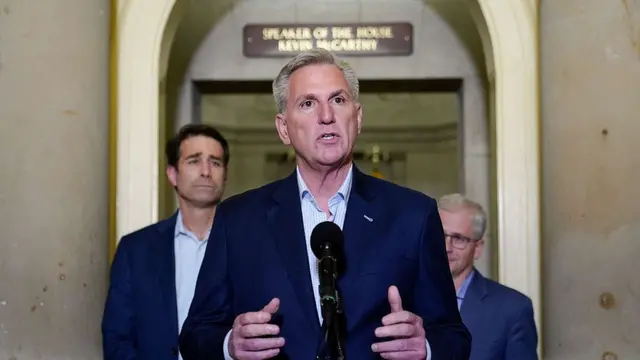Speaker Kevin McCarthy announced at a brief presser on Saturday night that House Republicans and the White House have reached a tentative deal to raise the federal government's debt limit, ending a months-long stalemate.
"I just got off the phone with the president -- I talked to him twice today -- and after weeks of negotiations, we have come to an agreement in principle," McCarthy said, emerging from his office shortly after 9:00 PM on Saturday. "We still have a lot of work to do."
McCarthy -- who did not take any questions from the press -- laid out next steps for the deal, including plans to post the text tomorrow and vote on the bill on Wednesday. "I expect to finish the writing of the bill, checking in with the White House and speaking to the president again tomorrow afternoon and then posting the text of it tomorrow and be voting on it on Wednesday."
The Speaker was light on specific details regarding the bill, instead calling it, "an agreement in principle that's worthy of the American people."
"It has historically reductions in spending, consequential reforms that will lift people out of poverty into the workforce, reign in government overreach. There are no new taxes, no government programs," McCarthy said.
The agreement reached between President Joe Biden and McCarthy is a two-year budget deal that would also separately raise the debt limit for two years, sources familiar with the negotiations told ABC News.
Sources say the budget deal would keep non-defense spending roughly flat with current levels in fiscal year 2024, increasing by 1% in 2025.
One source said the negotiating team is now working on finalizing bill text and a term sheet. House Democrats are invited to members only White House briefing tomorrow at 5 p.m., per one source.
The agreement phases in new work requirements for recipients of SNAP benefits - specifically time limits on the benefits for people up to age 54, excluding veterans and homeless people. Those new requirements would sunset in 2030, sources said.
There are no changes to Medicaid requirements, sources added.
The agreement also fully funds medical care for veterans, including an extension of funding in the PACT Act, one source said. And it would streamline the review process for certain energy projects.
The welcome breakthrough comes just days before June 5 -- the date Treasury Secretary Janet Yellen warned the U.S. could run out of cash to pay all of its bills on time.
A tentative deal will have to pass the Republican-controlled House and Democrat-controlled Senate.
Time is of the essence to push the deal through before potential default. McCarthy's pledged to give House members 72 hours to review the legislation before a vote. And in the Senate, it would only take one lawmaker to possibly delay approval for up to a week.
Wings from both parties expressed dissatisfaction during talks and encouraged their respective leaders to stand their ground.
The House Freedom Caucus, a group of conservative hardliners who held up McCarthy's ascension to the speakership, signaled opposition to anything other than the Limit, Save, Grow Act passed last month. On the other side of the aisle, several progressive Democrats warned they would push back on any deal that gave too many concessions to Republicans.
The fight over the debt ceiling has threatened to sink the economy.
Economists have warned the U.S. being unable to fulfill financial obligations would put millions of jobs at risk, increase unemployment levels and lead to higher prices for everyday items.
A default could also result in Social Security, Medicare and Medicaid payments -- as well as military pay and veterans benefits -- going unpaid or being delayed.
As the negotiations came down to the wire, Americans who depend on those checks expressed growing concern and anxiety surrounding their ability to pay rent, buy groceries and other daily expenses if default were to occur.
Air Force veteran Jacob Thomas in Minneapolis told ABC News' Elizabeth Schulze the uncertainty over default was already hitting American military families.
"Even if a deal is reached, everything winds up being okay next week, that still means that right now, families and veterans across the country are having to think about what does it mean for me to have to ration my current paycheck or my current disability paycheck," Thomas said.
(ABC)
 简体中文
简体中文

